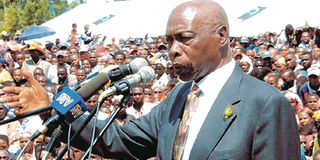Tribal groupings work against national unity, says Moi

Retired president Daniel arap Moi addresses a past public gathering. Photo/FILE
Former President Daniel arap Moi has criticised the re-emergence of ethnic-based political alliances ahead of the General Election.
Mr Moi said the existence of such tribal groupings was retrogressive to national unity and accused Gema and Kamatusa of trying to balkanise the nation.
“These tribal groupings of Gema and Kamatusa are retrogressive because they militate against national unity,” said the former head of state at a prize-giving day at Moi Kabarak Primary School.
“When you think like a Kamatusa or Gema, you shrink the world view and when moving around that tag is not something to be proud of,” said Mr Moi.
According to his press secretary, Mr Lee Njiru, when the former President ascended to power in 1978, he banned all ethnic-affiliated registered organisations to promote national harmony.
The former President’s reaction comes at a time the latest meeting by Kamatusa in Eldoret has elicited debate among the Kalenjin community in the diaspora over their resolution on the International Criminal Court case against Eldoret North MP William Ruto, who the meeting endorsed as the community’s presidential candidate. Kamatusa was first formed during Mr Moi’s reign.
On Saturday, local opinion leaders and those in the diaspora said the function was not all- inclusive and that there was no representation from the Maasai community.
Through live interviews aired by Kass FM International, callers dismissed the plea that athletes from the community boycott the upcoming Olympic Games.
But Naivasha MP John Mututho said ethnic affiliations were healthy for the country “because, at the end of the day, everyone belongs to a certain tribe”.
“When communities meet to chart the way forward in whatever issues afflicting them, they should be allowed to do so but this is being politicised to curtail harmony among the interested parties.”




